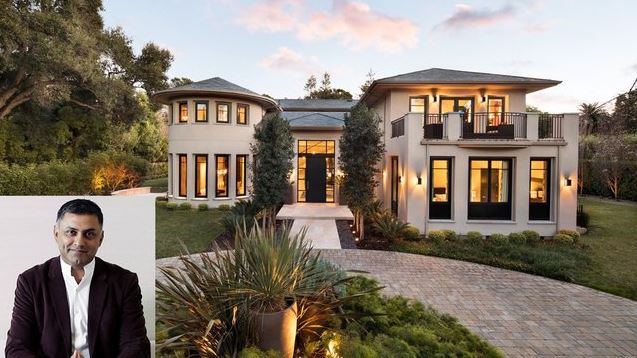A Tour of Nikesh Arora House and His Luxurious Real Estate
In 2023, the Texas Rangers stunned the baseball world by clinching the American League pennant, a feat that many analysts and fans considered highly unexpected given the team’s recent history. This remarkable achievement was not just a product of luck but the result of a deliberate strategy that mirrors aggressive real estate investments, similar to purchasing a prestigious property like the famed “Nikesh Arora house.” Much like Nikesh Arora’s strategic moves in the tech world and his investment in luxurious real estate, the Rangers’ approach involved calculated risks and high investments.
The team’s management embarked on a bold spending spree, echoing the tactics of a real estate investor stretching their budget to secure a highly coveted property beyond their initial price range. This approach in sports, akin to acquiring a mansion in an upscale neighborhood, involved signing high-profile free agents and trading for seasoned players to boost the team’s competitiveness. The financial commitment escalated the Rangers’ payroll from a modest $118 million in 2019 to an impressive $251 million by 2023.
Just as a buyer might leverage an adjustable-rate mortgage to finance a home like the “Nikesh Arora house,” which represents both luxury and a strategic investment, the Rangers leveraged their financial resources to assemble a team capable of competing at the highest levels. The comparison between high-stakes real estate transactions and major league team building provides a fascinating lens through which to view the Rangers’ 2023 season. It underscores the high risks and potential high rewards of such investments—whether in sports or real estate—demonstrating that success often requires the courage to commit fully to one’s vision.
| Aspect | Description |
|---|---|
| Texas Rangers’ 2023 Success | The Rangers clinched the American League pennant, a surprising and significant achievement. |
| Comparison to Real Estate Investment | The Rangers’ strategy mirrors aggressive real estate investments, similar to purchasing a prestigious property like the “Nikesh Arora house.” |
| Bold Spending Strategy | The team significantly increased payroll from $118 million in 2019 to $251 million in 2023 through high-profile free-agent signings and trades. |
| High-Risk, High-Reward Approach | The Rangers took calculated risks, akin to stretching a budget to acquire an upscale property, aiming for high rewards in their team-building strategy. |
| Strategic Investment Analogy | Like leveraging an adjustable-rate mortgage to finance a luxury property, the Rangers maximized financial resources to build a competitive team. |
| Conclusion | The Rangers’ 2023 season underscores the parallels between high-stakes investments in sports and real estate, emphasizing the courage needed to pursue a bold vision. |
Contents
Texas Rangers’ Team Spending and Real Estate Strategy
The Texas Rangers’ financial trajectory from 2019 to the present reflects a bold, strategic shift reminiscent of a high-stakes real estate gambit. Initially, the team’s payroll was relatively modest at $118 million in 2019, but significant investments in player acquisitions have seen this figure more than double to an impressive $251 million by 2023. This dramatic increase is akin to a homebuyer who stretches their financial limits to secure a property in a coveted area, betting on its value appreciation over time.

The Rangers’ strategy involved acquiring high-profile, highly-paid veterans to bolster their roster. This approach can be compared to real estate investors who purchase luxury properties like the “Nikesh Arora house” as both a status symbol and a strategic investment. In both scenarios, the initial outlay is substantial, but the potential returns—whether in sports victories or real estate value—can justify the expenditure. However, just like in real estate, such strategies involve significant financial risks and the potential for future difficulties, particularly if the market shifts or player performances do not meet expectations.
| Aspect | Description |
|---|---|
| Financial Trajectory | The Texas Rangers’ payroll increased from $118 million in 2019 to $251 million in 2023. |
| Investment Strategy | The team invested in high-profile, highly-paid veterans, similar to real estate investors purchasing luxury properties for long-term gains. |
| Comparison to Real Estate | Rangers’ financial strategy mirrors a homebuyer stretching their budget to secure a valuable property, expecting future appreciation. |
| Potential Risks | Both the Rangers’ strategy and high-stakes real estate investments involve significant risks, including market shifts or underperformance. |
| Strategic Purpose | The team’s spending, like purchasing a prestigious property, aims for long-term rewards, despite the high initial financial outlay. |
Player Profiles and Homes
This section delves into the real estate investments of key Rangers players, highlighting how their personal acquisitions reflect their career success and financial strategies.
Marcus Semien
Marcus Semien, an All-Star second baseman, joined the Rangers in 2021 with a lucrative seven-year, $175 million contract. His investment on the field has been mirrored by his purchase of a 1.2-acre lot in an exclusive gated community in Westlake, TX. Here, Semien is constructing a 7,848-square-foot custom mansion, signifying his commitment to both his professional and personal life in Texas. This property in Quail Hollow, an area known for its luxury and exclusivity, underscores Semien’s status as a top-tier player.
Corey Seager
Shortly after Semien’s signing, Corey Seager was brought on with a staggering 10-year, $325 million contract, underscoring the Rangers’ intent to build a competitive team. Off the field, Seager’s real estate ventures include a $4.95 million mansion in Brentwood, TN, featuring four bedrooms, an open floor plan, and a luxurious two-story study. This purchase reflects his long-term commitment to stability and comfort, paralleling his lengthy contract with the Rangers.

Jon Gray
Jon Gray, a crucial part of the Rangers’ pitching staff, was secured with a four-year, $56 million contract. His real estate dealings include a four-bedroom home in Scottsdale, AZ, purchased for $640,000 and currently listed for sale at $1,049,900. Gray’s property investments, like his baseball career, reflect a strategic approach to value and timing, emphasizing both short-term gains and potential long-term benefits.
Adolis Garcia
Adolis Garcia, celebrated for his role in the Rangers’ recent successes, has invested in a new, $3 million mansion in Keller, TX, following his MVP performance in the ALCS. This modern contemporary masterpiece, with seven bedrooms and a separate in-law wing, signifies his rising status in the league and his commitment to settling in Texas.
Nathan Eovaldi
Returning to Texas, Nathan Eovaldi, a Houston native, signed a two-year, $34 million contract with the Rangers. Eovaldi’s real estate choice—a spacious home in Friendswood, TX—provides a sanctuary for his family, featuring a game room and media room, tailored to offer comfort and entertainment.
Jacob deGrom
Despite health challenges, Jacob deGrom’s move to the Rangers was marked by a five-year, $185 million deal. His real estate investments include a $6.65 million Mediterranean-style mansion in Westlake, TX, part of the prestigious Vaquero Club, reflecting his high-profile status and his aspirations for recovery and longevity in his career.
Max Scherzer
Mid-season acquisition Max Scherzer’s purchase of a home in the Vaquero Club, just a stone’s throw from deGrom’s property, followed his trade to the Rangers. This purchase, although the price remains undisclosed, highlights his strategic choice to invest in a community known for its luxury and exclusivity.
Aroldis Chapman
Aroldis Chapman, known for his powerful pitching, maintains real estate holdings that reflect his dynamic career. From a luxury mansion in Davie, FL, to a high-end apartment in New York City, Chapman’s properties represent his financial acumen and his lifestyle.

Jordan Montgomery
As a midseason addition to the Rangers, Jordan Montgomery has kept a historical home in downtown Charleston, SC, as an income-generating property. This real estate investment mirrors his practical approach to his career, providing financial stability regardless of his free agency outcomes.
| Player | Contract | Property Description |
|---|---|---|
| Marcus Semien | 7-year, $175 million | Building a 7,848-square-foot custom mansion on a 1.2-acre lot in Westlake, TX. |
| Corey Seager | 10-year, $325 million | Purchased a $4.95 million mansion in Brentwood, TN, with four bedrooms and a two-story study. |
| Jon Gray | 4-year, $56 million | Owns a four-bedroom home in Scottsdale, AZ, listed for sale at $1,049,900. |
| Adolis Garcia | MVP of the ALCS | Purchased a $3 million modern mansion in Keller, TX, with seven bedrooms and an in-law wing. |
| Nathan Eovaldi | 2-year, $34 million | Owns a spacious home in Friendswood, TX, with a game room and media room. |
| Jacob deGrom | 5-year, $185 million | Owns a $6.65 million Mediterranean-style mansion in Westlake, TX, part of the Vaquero Club. |
| Max Scherzer | Mid-season acquisition | Purchased a home in the Vaquero Club near deGrom’s property. |
| Aroldis Chapman | Power pitcher | Owns properties in Davie, FL, and an apartment in New York City. |
| Jordan Montgomery | Midseason addition | Owns a historical home in Charleston, SC, used as an income-generating property. |
Management and Coaching Real Estate Moves
This section explores the real estate decisions of the Texas Rangers’ management and coaching staff, underscoring how their personal investment strategies parallel their professional roles in building a championship-contending team.
Chris Young
Chris Young’s transition from a major league pitcher to the general manager of the Texas Rangers is a tale of adaptation and strategic foresight, both on and off the field. After ending his playing career in 2017, Young swiftly moved into an executive role, bringing a player’s perspective to management decisions. His real estate investments reflect a similar strategic approach to his professional shifts.
In University Park, TX, Young owns a four-bedroom home that he purchased in 2019. The property, situated in one of Dallas’s most affluent neighborhoods, underscores his commitment to establishing roots in the area where he grew up and now shapes the future of the Rangers. This home, rumored to have been on the market for $2.35 million, signifies not just a personal investment but also a strategic one, placing him close to the Rangers’ administrative heart.
Further diversifying his real estate portfolio, Young has also invested in a property in Surprise, AZ, a key location given its proximity to the Rangers’ spring training facilities. In August 2022, he acquired a brand-new home in a developing area for just over a million dollars, a move that likely offers both personal convenience and investment potential, considering the region’s growth.
Additionally, from his days with the San Diego Padres, Young has held onto a property in La Jolla, CA. Purchased in 2007 for $5,315,500, the five-bedroom home has been a consistent source of rental income, listed occasionally for $20,000 a month. This investment illustrates his acumen in leveraging real estate for passive income, mirroring his strategic management of baseball assets.

Bruce Bochy
Bruce Bochy’s return to baseball management as the head of the Rangers marked a significant turning point for the team, especially during the postseason. His strategic moves and leadership have been pivotal in navigating the playoffs, much like his savvy real estate decisions have navigated different market conditions.
Bochy, who originally retired in San Diego, sold his Poway, CA, home in September 2022 for $2,755,000. He purchased this custom-built residence in 1997 for $590,000, and over the years, it featured a large pool, putting green, and a covered barbecue area — ideal for a retired manager enjoying the sunny California lifestyle. His profitable sale reflects a keen sense for timing and market dynamics.
Relocating to Tennessee, Bochy bought a modern Tudor home in College Grove for $3,498,000. This property, equipped with a chef’s kitchen, wine cellar, and golf course views, represents his new life phase — both a personal retreat and a potential long-term investment. Alongside this, he secured an additional parcel of land nearby for $684,000, emphasizing his belief in the value of owning real estate in emerging luxury areas.
| Management/Coach | Real Estate Moves |
|---|---|
| Chris Young | Purchased a four-bedroom home in University Park, TX, for $2.35 million in 2019. Also invested in a home in Surprise, AZ, near the Rangers’ spring training facilities for just over a million dollars in 2022. Retained a La Jolla, CA, property bought in 2007 for $5,315,500, generating rental income. |
| Bruce Bochy | Sold Poway, CA, home in 2022 for $2,755,000 (purchased for $590,000 in 1997). Relocated to College Grove, TN, purchasing a modern Tudor home for $3,498,000 and acquiring nearby land for $684,000. |
The Texas Rangers’ strategy for assembling a competitive team shares many parallels with their key figures’ approaches to real estate investment. Both realms require a keen eye for potential, an understanding of market timing, and the courage to invest heavily in the pursuit of long-term rewards. The team’s management and coaches exemplify this through their personal real estate portfolios, which are not only strategic but also reflect their lifestyles and foresight.
Reflecting on the sustainability of such investments, it becomes clear that whether in baseball or real estate, the principles of risk management, strategic investment, and foresight in decision-making are critical. The Rangers’ success on the field and the wise real estate choices by their management and coaching staff highlight a comprehensive approach to building success sustainably, leveraging both talent and assets to their fullest potential. This strategy, while fraught with risks, offers the potential for significant returns, mirroring the high stakes and high rewards inherent in both major league baseball and sophisticated real estate dealings.
VIP Real Estate -Inside R. Kelly’s Luxurious Olympia Fields House A Peek into
Inside Pauly Shore House A Look at the Comedian Unique Home
Kenny Rogers Home for Sale $4.2M Georgia Mansion
Kevin James House Sold in Delray for $12.67M
Kid Cudi House $7.7M Calabasas Luxury
Kim Zolciak-Biermann House Address in $6M Listing
Kris Kristofferson Ranch for Sale at $17.2 Million
